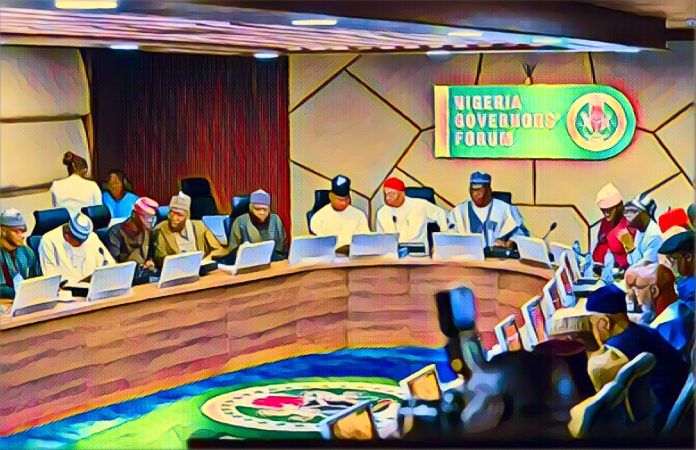Nigerian governors have gathered in Abuja to discuss pressing national issues, including the controversial minimum wage and the autonomy of local governments (LGs). This high-stakes meeting aims to find common ground on policies that have far-reaching implications for the country’s governance and economic stability.
The debate over the minimum wage has been a contentious issue in Nigeria. The Federal Government’s decision to set a uniform minimum wage of N30,000 ($78) has faced resistance from some state governors, who argue that the economic realities of their states make it difficult to comply. They contend that the financial burden of implementing the new wage could cripple their budgets and hamper the delivery of essential services.
Governor Kayode Fayemi of Ekiti State, who chairs the Nigeria Governors’ Forum (NGF), emphasized the need for a balanced approach. “While we acknowledge the importance of a fair minimum wage, we must also consider the diverse economic conditions across states,” Fayemi said. He called for a flexible framework that allows states to adjust the minimum wage based on their financial capabilities.
Another critical issue on the agenda is local government autonomy. Advocates argue that granting LGs greater independence will enhance grassroots development and improve governance. Currently, many LGs depend heavily on state governments for funding, which can lead to inefficiencies and delays in service delivery.
Governor Nasir El-Rufai of Kaduna State highlighted the importance of empowering local governments. “Autonomy for local governments is essential for effective governance and development at the grassroots level,” El-Rufai said. He stressed that true federalism requires that LGs have the authority and resources to manage their affairs independently.
The meeting also touched on other significant issues, such as security, infrastructure development, and healthcare. The governors discussed strategies to address the rising insecurity in various regions, including banditry, kidnapping, and communal clashes. Collaborative efforts between state governments and federal security agencies were emphasized as crucial for restoring peace and stability.
Infrastructure development remains a priority, with governors advocating for increased investment in roads, power, and other critical sectors. They highlighted the need for a more coordinated approach to infrastructure projects to ensure that investments translate into tangible benefits for citizens.
Healthcare was another focal point, particularly in light of the COVID-19 pandemic’s ongoing impact. Governors stressed the need for robust healthcare systems that can respond effectively to future health crises. They called for greater investment in medical facilities, healthcare personnel, and public health programs.
The outcome of the Abuja meeting is expected to shape policy decisions and influence legislative actions in the coming months. The governors’ resolutions will likely impact the ongoing negotiations with labor unions regarding the minimum wage and inform debates on constitutional amendments related to local government autonomy.
Political analysts believe that achieving consensus on these issues will require significant negotiation and compromise. “The diversity of Nigeria’s states means that a one-size-fits-all solution is unlikely to work,” said Dr. Jibrin Ibrahim, a political scientist at the Centre for Democracy and Development. “Governors will need to navigate complex political and economic landscapes to reach agreements that serve the national interest.”
Despite the challenges, there is optimism that the governors’ meeting will lead to positive outcomes. Many Nigerians hope that the discussions will result in policies that promote economic growth, enhance governance, and improve living standards across the country.
The governors’ willingness to engage in open dialogue and seek collaborative solutions is a hopeful sign for Nigeria’s future. As the country faces numerous challenges, from economic pressures to security threats, such forums are essential for fostering unity and driving progress.
Source: businessday.ng



